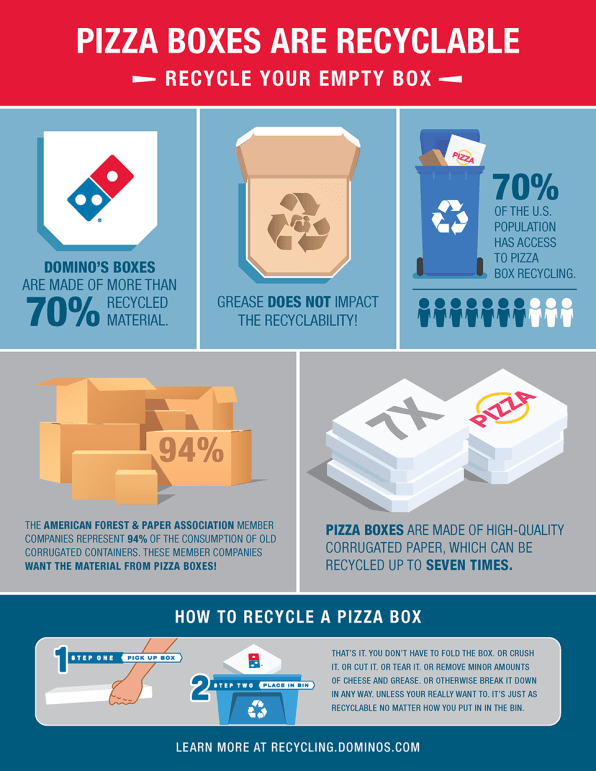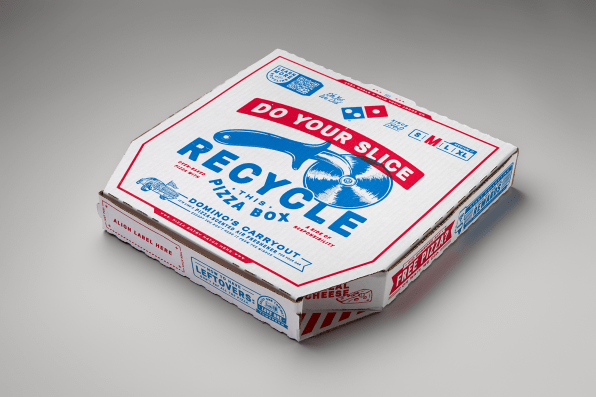[ad_1]
Imagine the scene: After you and and your partner enjoy a margarita pizza and a bottle of wine, you stare at the empty, greasy box and discuss what to do with it. You believe you should put the box in the recycling bin; they’re worried that all the leftover cheese and oil on the cardboard will contaminate the recycling system. You both want to do the right thing, but it isn’t entirely clear what that is. Perhaps the discussion ends amicably, perhaps it does not.
This same post-pizza conversation happens across the country. Two years ago, Domino’s announced that its pizza boxes were recyclable–but there was a catch. Only 73% of the population has access to a curbside recycling program that accepts these empty boxes, and it takes time and effort to research whether your municipality is one of them. This has left many consumers confused.

Domino’s wants to clear things up for its customers. It has started rolling out redesigned pizza boxes that replace its iconic domino logo with the words “Recycle This Pizza Box.” Importantly, the box also features a QR code that takes you to a website where you can input your zip code to see the exact regulations in your neighborhood. The $17.8 billion pizza delivery giant hopes this will nudge consumers to change their behavior, but it is unclear how well it will work.
While some consumer brands, like Colgate, have had to redesign their packaging to make them recyclable, clean pizza boxes have always been accepted by recyclers, so Domino’s hasn’t had to change the structure. The issue is that for a long time, recycling facilities forbid pizza boxes because they believed the grease from the pizza would affect the quality of the recycled content.
But as Fast Company has reported, Domino’s box supplier, WestRock, wanted to test this assumption. In 2020, it commissioned a study in which is put extremely dirty boxes—where grease made up 20% of the cardboard’s weight—into the recycling stream. Ultimately, the boxes made it through the system with no loss in the strength of the paper. And most pizza boxes don’t actually have that much grease in them at all, averaging only 1% to 2% of the weight. In recent years, local policies have started to change.
Domino’s goal is to get this message out to consumers. The Sustainable Packaging Coalition has found that there are little things brands can do to nudge them in right direction. For instance, consumers are less likely to recycle a package if it is crumpled or torn after use, so creating boxes that preserve their original shape can help. And brands can make consumers feel more confident about recycling by providing clear, consistent instructions on a prominent part of the packaging.

“We often use (the box) for promoting our own products,” says Fredric Lund, SVP of global development and sustainability at Domino’s. “It’s a really personal intimate connection we have with our customer, because its right there on your kitchen table—sometimes its even a plate for your pizza.”
While this is part of Domino’s mission to be a more sustainable company, it’s not purely altruistic. “Arming our consumers with this knowledge and encouraging them to be part of our stewardship journey also makes them feel good about enjoying their pizza,” he says.
Besides clarifying the recyclability of the boxes, Domino’s wants customers to help change the system. These days, 27% of all recycling programs in the United States have explicit language saying they accept pizza boxes; the other 46% implicitly accept them. On its recycling website, Domino’s gives customers information about how to contact recycling programs to ask for more explicit guidelines about accepting pizza boxes. And in the remaining 27% of programs that prohibit pizza boxes, Domino’s encourages customer to reach out to them so they can reevaluate their guidelines based on WestRock’s research.
“We’ve seen this play out in some neighborhoods,” Lund says. “Just a quick call to your municipality saying, ‘Hey, wait a minute, can I recycle this pizza box?”
[ad_2]
Source link

